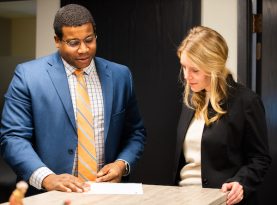With the start of the 2023 Minnesota legislative session Jan. 3, the Minnesota Catholic Conference, the official public policy voice of the Catholic Church in Minnesota, is putting families at the top of its advocacy strategy for the year.

“Oftentimes in the public arena, we’re stuck dealing with the downstream challenges of family fragmentation, poverty, addiction. … We thought it would be prudent to think about going upstream in the policy ecosystem and think about, how do we promote and strengthen the well-being of families?” said Jason Adkins, executive director of MCC.
In addition, with the push from some legislators to remove limitations on abortion, Adkins also stressed that “if we’re going to have a permissive abortion policy in Minnesota, we also want to make Minnesota the best place to have a child, raise a child and help that child flourish.”
In light of this goal, MCC will promote a “Families First” agenda — a series of bills and policies that seeks to put families first by promoting the economic and holistic prosperity of families.
“We want to lower barriers to family formation and having a child,” Adkins said.
To date, there are 13 different policy proposals as part of the Families First Project. Among them are a “lifetime state income tax exemption for women who have four or more children,” a “Minnesota Minivan Act,” which would create a grant program to offer $5,000 to families with three or more children to buy a larger vehicle, and a “paid caregiver leave policy.”
The centerpiece, Adkins said, is the child tax credit, which is a fully refundable per-child tax credit that would offer $1,200-$1,800 a year.
“We think it’s a matter of what we call tax justice and tax fairness to families,” he said.
Adkins said the Families First Project “transcends” both partisan and ecclesial divides.
“It can both strengthen families … and encourage family formation and childbearing, but it also can help economically support those most disadvantaged,” he said. “It’s tailored toward low- and middle-income families,” he said.
Adkins believes the Project can give Catholics a cause to rally around. He stressed the importance of the family as the building block of society and a mirror of the Trinity.
“We’ll be focusing on about five or six [proposals] from the standpoint of our staff this session, but we’ll also be encouraging Catholics and giving them the tools on our website to advocate for these bills themselves,” Adkins said.
He noted the Catholic call to faithful citizenship, saying the tools MCC provides are not just advocacy resources, but catechetical tools as well.

“We want to help Catholics understand how Catholic social teaching applies in a variety of contexts,” he said.
Achieving the goals of the Family First initiative will take time. MCC hopes to get the majority of bills for the Families First Project passed by the end of the 2026 legislative session.
Adkins encouraged Catholics to join and rally for the cause. As faithful citizens, it’s not just about showing up to vote every couple of years, but about being an “advocate for policies that impact human dignity and the common good,” he said.
“Pick a policy, educate yourself about it and the potential impact; we give you the tools on the website, and then go talk to your legislator,” he said.
This could be done through parish groups, such as a respect life committee or social concerns group. He said the project is “a powerful opportunity to come together and advocate for good legislation.”
Other issues that the Minnesota Catholic Conference will be monitoring in 2023:
- Legalization of recreational marijuana: “We will take a strong opposition to the legalization of recreational marijuana, which is not simply decriminalization,” Adkins said. “We think there could be reforms to sentencing laws and other things that have a social and racial justice impact. But oftentimes people are using the need to do sentencing reform and criminal justice reform as an excuse to create a commercial and recreational marijuana business, and we think that’s definitely the wrong approach.”
- Education savings account and school choice: MCC will continue to advocate for education savings accounts as a different paradigm for education finance. “Education dollars should follow students, and not systems. … School choice is a positive alternative to simply putting more money into the system as a balm for addressing persistent achievement gaps, the presence of very divisive curriculum, and … underperforming schools that for whatever reason aren’t serving some students’ well-being.”
- Technology access reform: “I don’t think (some) people fully grasp the way in which technology companies are targeting our children… Some of the things we’ve already been supporting was a bill last year that limited the use by tech companies of certain algorithms that target and seek to pull in children and young people to their social media platforms. … There also needs to be some consideration given to allowing parents to approve whether or not their child uses social media apps.”
- Immigrant driver’s licenses: “We’re forming our coalition and working on provisional immigrant driver’s licenses. It’s back on the table, so we’re looking forward to finally perhaps getting that across the finish line.” The measure would improve the situation of immigrant families and protect public safety, according to MCC.
- Human services and homelessness: “We’ll continue to work on homelessness issues and making sure that our human services programs are protected and that there are relative cost-of-living adjustments when appropriate.”
GET INVOLVED
MCC offers several ways for Catholics across the state to participate in public policy advocacy.
Catholic Advocacy Network
Sign up at www.mncatholic.org for alerts via email and/or text about important state and federal legislative activity and how to contact your lawmakers with a single click.
Capitol Thursdays
When: Every second and fourth Thursday of the month, January-May, 10 a.m.
Where: MCC’s office (525 Park Street, St. Paul) and Minnesota State Capitol
Catholics from across the state are invited to MCC’s headquarters to learn about MCC’s public policy issues. Then, participants will have the opportunity to visit the Capitol and meet with their legislators. Interested participants should RVSP no later than noon the Wednesday before. MCC can help participants identify and locate their legislators. There is free parking available at MCC’s office.
First Friday Adoration
When: First Fridays, January – May (April is moved to the 14th due to Good Friday), 9 a.m. – 4 p.m.
Where: Governor’s Dining Room, Minnesota State Capitol
Catholics are invited to pray for elected officials during adoration in the Governor’s Dining Room in the lower level of the State Capitol. No RVSP is required. Note that April’s date is moved to the 14th due to Good Friday. Free parking at MCC’s office.
United For Life
When: Tuesday, Feb. 28
Where: Minnesota State Capitol
Join fellow Catholics and Minnesota pro-life organizations to be “united for life” at the Capitol. It will be a day dedicated to advocating for policies that protect the unborn and support mothers. It will include a gathering in the Capitol rotunda, speakers and advocacy opportunities. More details will be available at www.mncatholic.org.






















